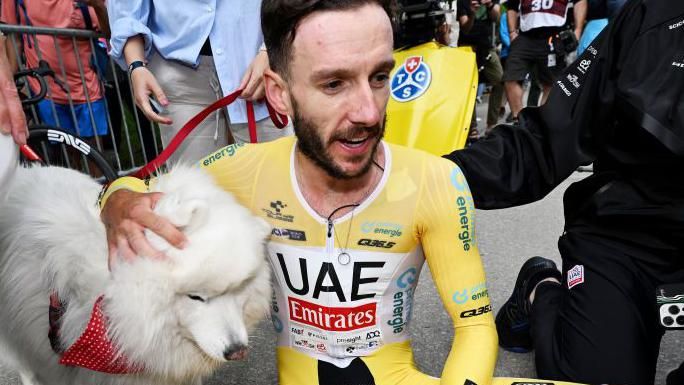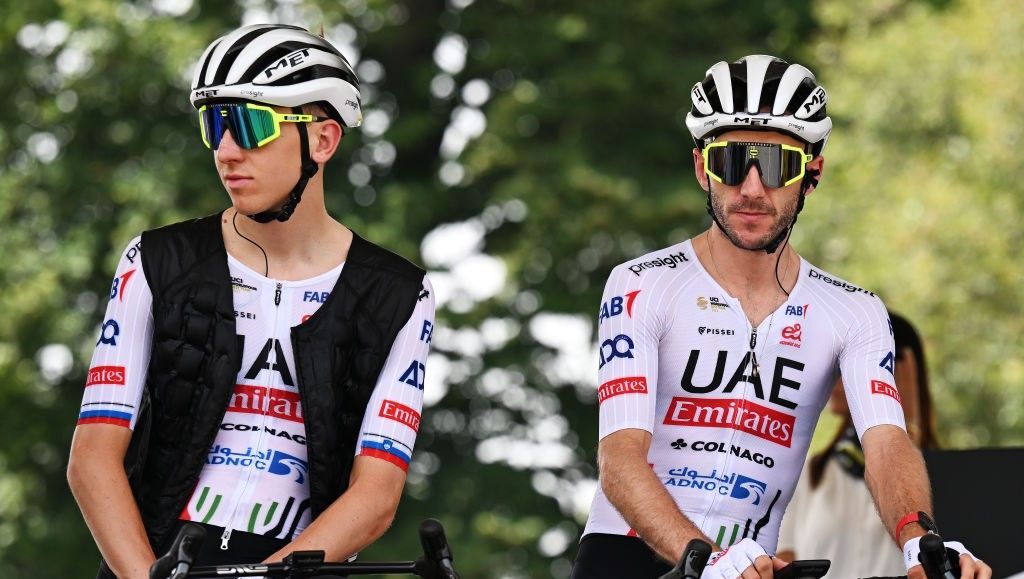
Britain’s Adam Yates starts this year’s Tour de France as one of the most important riders in the 176-strong peloton.
Last year he won the opening stage and wore the yellow jersey, beating his twin brother Simon in the process.
This year he is once again part of the UAE-Team Emirates squad which will help Tadej Pogacar try to make history by winning the Giro d’Italia and Tour de France in the same year.
But Yates, 31, may not even have made it to cycling’s biggest race following a harrowing crash which caused a concussion.
“I don’t really remember any of it, from the moment of impact to maybe an hour after,” says the former Ineos Grenadiers rider.
In February’s searing Emirati heat, as Yates was dialling himself into the peloton for another long road cycling season during the UAE Tour, his front wheel appeared to clip a competitor’s, which saw Yates twist around and hit his head on the tarmac in violent fashion.
It was difficult to watch.
“It was probably one of the worst crashes [I have had],” Yates says. “It was a nasty one. I didn’t get much road rash but hit my head pretty hard.
“When I kind of came to, I knew something wasn’t right.”
Yates spent several weeks off the bike and only considered himself “conditioned” again following victory at this month’s Tour de Suisse.
“I was in great shape at the time and the UAE Tour was a big race for the team – a home race.
“I had three weeks off the bike, which is like an off-season. It has not been easy.”
Cycling’s head-injury problem
Head injuries in elite sport are becoming more and more of an issue, as athletes and former athletes suffer serious conditions relating to injuries sustained in competition.
While there is nothing to suggest Yates’ injury will be lasting, professional cycling in particular has a problem with head injuries.
The need for a cyclist to get up and back on their bike after a fall – before they lose touch with the already advancing peloton – means they often feel they have little choice but to continue.
The sport’s governing body the UCI introduced protocol in 2021 for race doctors and other team members to try to recognise concussion and consider taking a rider out of a race.
This followed several serious incidents over the years, including France’s Romain Bardet continuing during the 2020 Tour de France, only to discover at the end of the stage he had suffered a minor brain haemorrhage.
And the tragic story of American Olympic silver medal-winning cyclist Kelly Catlin – who took her own life following a serious of concussions which many believe was related to CTE (chronic traumatic encephalopathy).
It is the concussion, and its long-term effects, which seems to cause as much confusion for the medical profession as it does the patients.
Yates eventually stopped after his impact, but initially had jumped back on his bike and carried on.
“The team said to have two or three weeks off the bike to fully recover. But I still didn’t feel 100% so we took a bit more time off and fully recovered – we didn’t want to take any unnecessary risks.”

Safety on agenda during hectic Tour
The accident was one of many which has had a big effect on the shape of the season so far.
The highest profile was a huge crash in April’s Itzulia Basque Country, which seriously injured Tour de France champion Jonas Vingegaard and two of his main competitors for this year’s Tour, Primoz Roglic and Remco Evenepoel.
All have since recovered, but Vingegaard’s surgery for bruised and punctured lungs means he has not competed until the big race this weekend, and could still be compromised.
So much has gone wrong on the road this year, that Ineos owner Sir Jim Ratcliffe has even written an open letter to the UCI about safety in the sport.
And the UCI itself has introduced a ‘yellow card’ system “for any offence likely to pose a risk”.
Plus, it is not lost on Yates, or anyone else, that his superb victory in Bilbao on stage one last year came after tributes to Team Bahrain Victorious rider Gino Mader, who was killed in a crash during a descent just days before.
So how does Yates feel about the risks cyclists appear obliged to take to gain an advantage on closed public roads, which cannot possibly be removed of trees, rocks and other furniture which can become deadly at speeds of up to 90kph?
“To be honest I’m quite cautious in the way I ride,” he says. “A lot of guys do take risks and push boundaries, but I’m not one of those guys. I know what I need to do to win, but I don’t take extra steps and put my life on the line.
“The sport’s always getting quicker, and the equipment we use is always getting faster. So there’s always more risks.”
Race organisers have made changes since Mader’s death, and following the introduction of the UCI’s SafeR initiative.
“I understand how tricky it is to organise a race,” adds Yates. “And with riders it’s in our nature to try to win – that’s what we’re paid to do.
“I’m not a person who knows to really comment, but if we race on certain roads that are bigger and wider, you have a bit more space to manoeuvre. Maybe that’ll make differences, but in the end it’s a tricky topic.”
Whatever the answers are, everyone in the sport is happy to see Yates riding again, and riding well.
“I don’t really have any big [career] goals – I just want to perform at my best. It was tricky, but I’m alive and still on the bike.”
